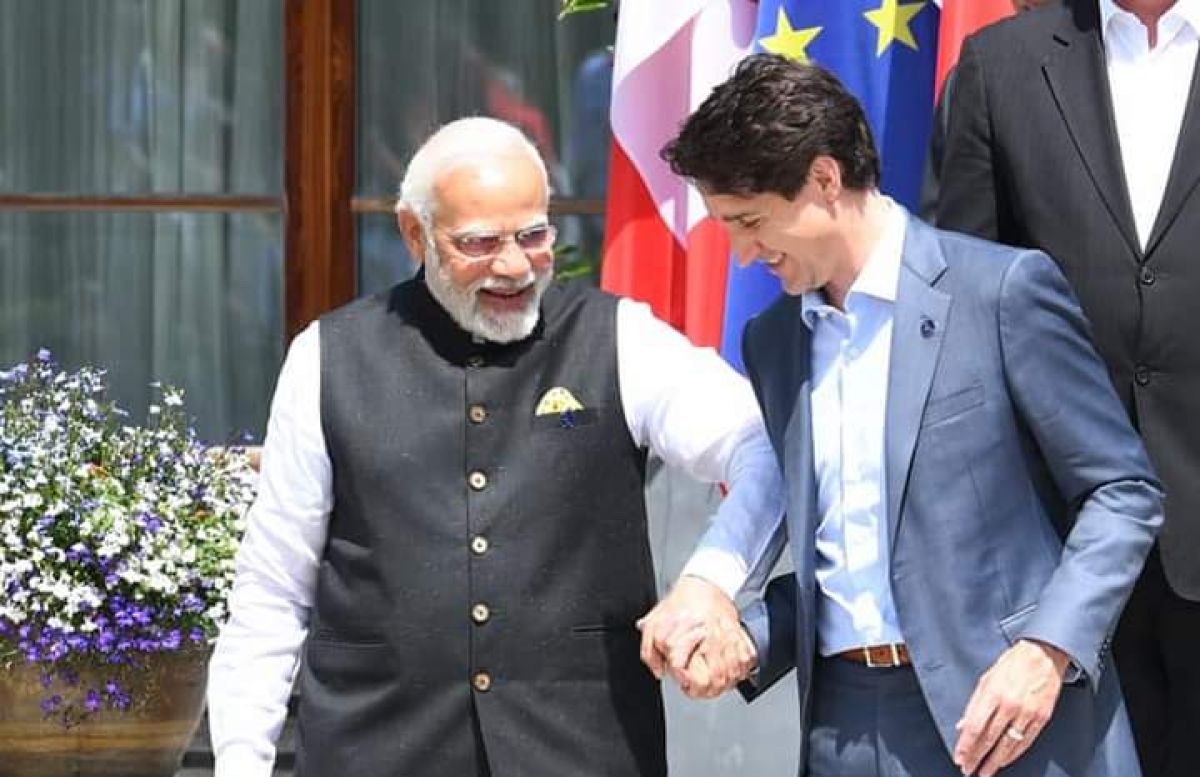For quite some time, political punditry had been skeptical of Justin Trudeau’s popularity as prime minister. His Liberal Party of Canada (LDC) did not have a majority in the House of Commons, necessitating forging a coalition with the New Democratic Party (NDP), led by Jagmeet Singh and supported by a million-strong Indian Sikh Diaspora in Canada.
Weeks before Trudeau’s announcement to resign as prime minister, one could sense a chaotic situation developing in Canadian politics. The Deputy Prime Minister, Chrystia Freeland, disagreed with Trudeau over the handling of threats by Donald Trump – the President-elect of the US.
She had expected Trudeau to react stoutly to Trump’s bossism. Why Trudeau could not defend his country’s sovereignty is something that raised eyebrows. Freeland had stood by the side of her boss for nearly a decade. As such, her departure unmistakably indicated a rift within Trudeau’s party on fundamental policy parameters.
Weeks before announcing his decision to resign as the prime minister and as the chairman of his party, Trudeau had changed one-third of his team to overcome the party’s internal crisis. That did not work, and Trudeau became increasingly uncertain about his political survival.
Even his coalition partner Jagmeet Singh of NDP had warned that if a no-confidence vote was tabled in the House of Commons, his party would vote against Trudeau to bring down his government. One of the Trudeau-Jagmeet Singh alliance conditions was that the agreement between the two parties would last until September 2024.
It is not clear what were the reasons for the NDP to issue a warning. The irony is that Trudeau risked Canada’s cordial relations with the world’s largest democracy to please the NDP. However, in the end, the same party betrayed Trudeau.
This should serve as a stark warning to various political formations in Canada that a Diaspora that is not loyal to its home country of origin cannot be loyal to a country of adopted citizenship.
Nevertheless, a vast majority of Canadian Sikhs have a great fascination for their original homeland because their roots are deep in Indian civilization. It is only the Khalistani separatist group – the killers of former Indian Prime Minister, Indira Gandhi – who are prompted by a third country’s intelligence agency to play an anti-India card not only in Canada but also in the UK and partly in Australia.
Trump Factor
The election of Donald Trump did not augur well for Trudeau’s government. Trump has indicated what he means by his old slogan, “America first.”
His comments about Canada and Trudeau are essentially focused on how the US President-elect would like to handle Canada regarding increased tariffs, drug mafias, illegal immigration, etc. It is a bilateral affair between the two countries and has nothing to do with the Canada-India logjam.
However, it does reflect an important aspect of Canada’s relations with the US. We all know that there was a well-calculated conspiracy to malign India in a false accusation of Sikh separatist Hardeep Singh Nijjar’s murder in Canada. The canard originated with the “Five Eyes” or the American deep state to use the diplomatic jargon.
The purpose was to create a deep chasm between Prime Minister Narendra Modi’s government in New Delhi and the Canadian Sikh Diaspora. Trudeau was pressurized to brazenly accuse India of the murder of the Khalistani activist without having solid proof except that of taking a cue from a story concocted by the Five Eyes – five English-speaking countries.
When Trudeau entered Canadian politics years ago and seemed to be riding the crest of popularity with his voters, he had promised to reform elections, tackle climate change, and legalize marijuana. “He was seen as this Canadian rock star,” said Duane Bratt, a political scientist at Mount Royal University in Calgary.
Trump has threatened to impose heavy tariffs on imports from Canada. He has trolled Trudeau in recent weeks by describing him as the “Governor” of the 51st American State.
Trudeau’s voters think he is not doing enough to counter Trump’s charges. They blame him for the country’s sluggish economy, the housing crisis, and near-record immigration levels. His party members believe it is highly unlikely that he can lead the Liberal Party to victory in the next election due by October this year.

Open Dissent
In her letter of resignation, the Finance Minister, who was also the Deputy Prime Minister, brought out the weak-kneed political demeanor of Trudeau, saying he “embraced costly political gimmicks” instead of directly confronting Donald Trump. She also accused Trudeau of putting his interests ahead of Canadian interests.
The Finance Minister’s statement and resignation strengthened the view that Justin Trudeau should step down. Three opposition parties have demanded that new elections should be held to do away with an atmosphere of uncertainty.
Canadian – Indian Relations
Political circles are debating whether Trudeau’s exit will normalize strained relations between India and Canada. Generally speaking, states have broad parameters of foreign policy that do not change substantially with a regime change.
India and Canada have always enjoyed cordial relations. Admittedly, Trudeau’s reckless accusation of India was a bad political move. It appears he was dancing to a third party’s tune. Hence, his clumsy rant against India was an aberration. Therefore, this aberration needs to be set right. That depends on how the incoming administration looks at the entire gamut of the Indo-Canadian relationship.
Secondly, the NDP has emerged as a factor in Canada’s domestic politics and cannot be wished away. The question is that responsible governments do not allow domestic politics to influence the essential parameters of their foreign policy.
Responsible governments do not ignore the counsel of a friendly country to deny entry to known criminals against whom cases are pending in the court.
Contrarily, the Trudeau government not only allowed listed criminals of Khalistani separatists in Punjab to travel to Canada clandestinely or otherwise but also gave them the senseless freedom of indulging robustly in anti-India and anti-Hindu propaganda.
The Khalistani goons even went further and threatened the Indian mission functionaries in Canada with physical violence. The Canadian government took no cognizance of this grave violation of the Geneva Protocol.
Much depends on the new incumbent in the PM’s office in Ottawa. If it thinks that Trudeau has not handled the Indo-Canada spat with deft hands, then he or she will have to take a holistic view of the entire gamut of relations.
It is a two-piece issue, viz. The assassination of a pro-Khalistani pronounced criminal is one part of the issue, and Indo-Canada relations are the other part. Each part has to be dealt with on its own merit.
The Five Eyes will have to disclose the source of its information not only in the case of Nijjar but also in the case of Gurpatwant Singh Pannun, the target of an alleged India-hatched conspiracy. Why does the deep state of the US or Canada evince extraordinary interest in the Khalistani movement and its activists should become a topic of sensitive research.
In the final analysis, restoring normal relations between India and Canada essentially depends on when the Canadian government stops allowing criminals and terrorists to enter Canada and use its soil for propaganda against India. India is not going to tolerate Canada allowing its soil to be used by religious extremists against the interests of India.
Canada has to abide by the general advisory of the United Nations that the criminals and terrorists who perpetrate crimes against humanity have not to be given any quarter.
Therefore, the nature of Indo-Canada bilateral relations in the future depends on to what extent the new Canadian government responds to its responsibility of observing the international protocol of diplomatic relations among the world’s countries.
- Prof. KN Pandita (Padma Shri) is the former director of the Center of Central Asian Studies at Kashmir University.
- This article contains the author’s personal views and does not represent EurAsian Times’ policies/views/opinions in any way.
- The author can be reached at knp627 (at) gmail.com




